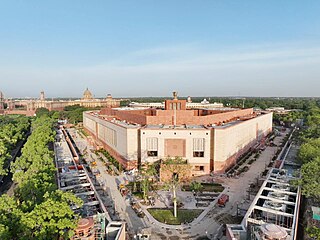
India is a federal union comprising 28 states and 8 union territories, for a total of 36 entities. The states and union territories are further subdivided into 806 districts and smaller administrative divisions.

The National Democratic Alliance is an Indian big tent multi-party political alliance, led by the country's biggest political party, the Bharatiya Janata Party (BJP). It was founded on 15 May 1998. It currently has a majority in both the Lok Sabha and the Rajya Sabha, and controls the Government of India as well as the governments of 19 out of 28 Indian states and one Union territory.

A member of the Legislative Assembly (MLA) is a representative elected by the voters of an electoral district (constituency) to the legislature of State government in the Indian system of government. From each constituency, the people elect one representative who then becomes a member of the Legislative Assembly (MLA). Each state has between seven and nine MLAs for every Member of Parliament (MP) that it has in the Lok Sabha, the lower house of India's bicameral parliament. There are also members in three unicameral legislatures in Union Territories: the Delhi Legislative Assembly, Jammu and Kashmir Legislative Assembly and the Puducherry Legislative Assembly. Only a Member of the Legislative Assembly can work as a minister for more than 6 months. If a non-Member of the Legislative Assembly becomes a Chief Minister or a minister, he must become an MLA within 6 months to continue in the job. Only a Member of the Legislative Assembly can become the Speaker of the Legislature.
The administrative divisions of India are subnational administrative units of India; they are composed of a nested hierarchy of administrative divisions.

The constitutional power to create new states and union territories in India is solely reserved with the Parliament of India, which can do so by announcing new states/union territories, separating territory from an existing state or merging two or more states/union territories or parts of them. As of 2024, there are 28 states and eight union territories in India.

The following outline is provided as an overview of, and topical guide to, India:
The Lokayukta is an Indian Parliamentary Ombudsman which may be appointed for each of the State Governments of India. It is brought into effect in a state after passing the Lokayukta Act in the respective state legislature, and a person of reputable background is nominated for the post. The post was created to quickly address the working of the government or its administration. Once appointed, Lokayukta cannot be dismissed or transferred by the government, and can only be removed by passing an impeachment motion by the state assembly.
The Commissioner of Police, Delhi or Delhi Police Commissioner is the head of the Delhi Police, the law enforcement agency of the 15 police districts of India's capital, Delhi.

A union territory is a type of administrative division in the Republic of India. Unlike the states of India, which have their own governments, union territories are federal territories governed, in part or in whole, directly by the Central Government of India. There are currently eight union territories in India: Andaman and Nicobar Islands, Chandigarh, Dadra and Nagar Haveli and Daman and Diu, Delhi (NCT), Jammu and Kashmir, Ladakh, Lakshadweep and Puducherry.

The Jammu and Kashmir Legislative Assembly, also known as the Jammu and Kashmir Vidhan Sabha, is the legislature of Indian union territory of Jammu and Kashmir.
Officially known as The Constitution Act, 2016, this amendment introduced a national Goods and Services Tax (GST) in India from 1 July 2017. It was introduced as the One Hundred and Twenty Second Amendment Bill of the Constitution of India,

Jitendra Singh Rana is an Indian physician and politician who is serving as the 18th minister of Science and Technology and minister of Earth Sciences since 2024. For Prime Minister's Office; Personnel, Public Grievances and Pensions; Department of Atomic Energy and Department of Space. He was elected to 18th Lok Sabha from Udhampur with the majority of 124,373 votes.
Lalit Kumar Doley was an Indian politician and a leader of the Indian National Congress political party in Assam.
Jammu and Kashmir State Ranbir Penal Code or RPC was the main criminal code applicable in the erstwhile Indian state of Jammu and Kashmir. The Indian Penal Code, applicable elsewhere in India, was not applicable here under Article 370 of the Constitution of India.

Member of Parliament (MP) in India refers to persons who serve in the Parliament of India. These include:

The Jammu and Kashmir Reorganisation Act, 2019 is an act of the parliament of India containing provisions to reconstitute the state of Jammu and Kashmir into two union territories (UTs) called Jammu and Kashmir, and Ladakh, and becoming effective on 31 October 2019. A bill for the act was introduced by the Minister of Home Affairs, Amit Shah, in the Rajya Sabha on 5 August 2019 and was passed on the same day. It was then passed by the Lok Sabha on 6 August 2019 and it received the president's assent on 9 August 2019.
Kewal Kumar Sharma is a 1983-batch retired Indian Administrative Service (IAS) officer of Arunachal Pradesh, Goa, Mizoram and Union Territories (AGMUT) cadre. In November 2018, he was appointed as advisor to the governor of Jammu and Kashmir, Satya Pal Malik. Following the creation of the union territory of Jammu and Kashmir, he was appointed advisor to lieutenant governors Girish Chandra Murmu and Manoj Sinha. In February 2020, he was appointed as the chairperson of the JK Board of Technical Education. On October 30, 2020 he resigned as advisor to the lieutenant governor and was appointed election commissioner of the union territory. Sharma has also served as advisor to the administrator od Chandigarh, chief secretary of Goa and Delhi after which he moved to the Union HRD Ministry where he served as Secretary Higher Education, Govt. of India.

The North-Eastern Areas (Reorganisation) Act, 1971 was a major reform of the boundaries of India's North-East region into States and union territories.
The Constitution Act, popularly known as the Women's Reservation Bill, 2023, was introduced in Lok Sabha on 19 September 2023 during the special session of Parliament. This legislation seeks to allocate 33 percent of the seats in the directly elected Lok Sabha, State legislative assemblies and Delhi legislative assembly for women.








